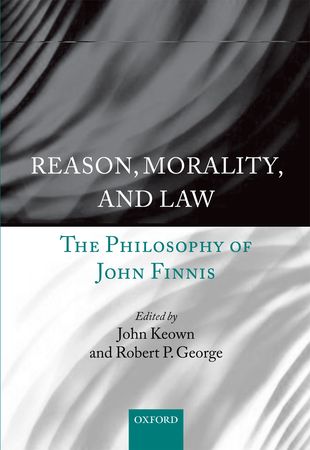Reason, Morality, and Law: The Philosophy of John Finnis
John Keown, one of the Jericho Tree contributors, talks about his new co-edited volume on renowned legal philosopher, and leading authority on the law and ethics of medicine, John Finnis.
Why did you decide to take on this Festschrift?
John Finnis, Emeritus Professor of Law and Legal Philosophy at Oxford, and Biolchini Family Professor of Law at Notre Dame, is one of world’s leading thinkers. A leading authority on legal, moral and political philosophy, constitutional law, medical law, theology and Shakespeare, he is probably best known for his development of the “new classical” natural law theory. His seminal work is Natural Law and Natural Rights, published by Oxford University Press in 1980. In 2011 OUP published a second edition of this work, together with five volumes of his Collected Essays.
It occurred to me that, sooner or later, someone would propose a Festschrift in his honor and I thought that it might as well be sooner and it might as well be me. (Professor Finnis supervised my doctoral thesis in Oxford on the history of the law of abortion and he has been an invaluable source of sage counsel and generous support to me over the years, as I know he has been to his other former students.)
I am not, however, a legal philosopher, so I invited another former doctoral student of his, Professor Robert P. George (McCormick Professor of Jurisprudence at Princeton) to co-edit the volume with me. Together we drew up a list of 25 distinguished contributors (including such famous names as Sir Anthony Kenny, Joseph Raz and Jeremy Waldron) reflecting the breadth of Finnis’s scholarly interests, and secured their agreement to participate. Given their eminence and corresponding commitments we were surprised and delighted by the enthusiasm with which they agreed. Indeed, we found ourselves in the enviable but awkward position of having politely to decline offers to contribute from other distinguished scholars who had got wind of the project! Oxford University Press accepted our proposal with alacrity.
Could you summarize your own essay in the volume?
Although John Finnis is internationally recognized as a leading authority on legal philosophy and on constitutional law, it struck me as odd that he is not widely thought of as a leading authority on the law and ethics of medicine.
In the UK, for example, Professor Glanville Williams is regarded as the “grandfather” of that discipline and Professor Sir Ian Kennedy as one of its “fathers”. My essay sketches Finnis’s prodigious scholarly output in the law and ethics of medicine across 40 years and concludes that it easily qualifies him as one of the leading figures in the field, nationally and internationally. Indeed, I conclude that, because of the uniquely powerful combination of legal and philosophical expertise that he brings to the discipline (neither Williams nor Kennedy, for instance, wrote as lawyer-philosophers) it is not easy to think of other lawyers in this field who are his equal. I also suggest that there is a good case for yet another volume, one which would bring together his writing on the law and ethics of medicine. But that would be another project!
How is it different from other books honoring distinguished scholars?
We did not want the volume to be a hagiography, as some Festschriften can be. Nor, we were sure, would John Finnis have wanted that. He has devoted his academic life to the pursuit of truth through scholarship of the highest standard, often involving vigorous but always scholarly and fair debate with other distinguished scholars such as the late Ronald Dworkin (his former colleague at University College, Oxford).
We wanted to explore and advance understanding of his thinking by inviting leading scholars from a variety of disciplines and viewpoints to engage with his writing or topics he has addressed in his writing. To further promote debate, and somewhat unusually for a Festschrift, we invited the honoree to reply to the contributors’ essays. The upshot is a rather substantial volume comprising 27 essays (by the 25 invitees and the 2 editors), followed by a response by John Finnis.
The initial idea was that his response would be of roughly the same length as the other essays (around 10000 words), but so engaged was he by the essays that he ended up producing a response of some 50000 words. This was an unexpected bonus: the essays provoked a book-length response by the honoree, clarifying points of agreement and disagreement with the other contributors, and significantly advancing understanding of his thinking.
What are the aims of the volume, and what are its particular strengths?
Following on from my answer to the previous question, the key aim is to advance understanding of his thinking, particularly but not exclusively in relation to legal and moral philosophy, through debate with other leading scholars, many of whom either do not subscribe to natural law theory, or who do but who disagree with him on certain aspects of it. The range and quality of essays is a key strength, and his response to them is another.
Who is it aimed at?
It is aimed primarily at scholars and graduate students working in legal, moral and political philosophy, particularly those interested in natural law. But the range of disciplines and issues covered in the volume mean that parts of it will interest other scholars and students, such as those interested in constitutional law, bioethics or religious freedom.
[First posted here on the Georgetown website. Used with permission of John Finnis.]
Tags: Catholic philosophy, John Finnis, law, morality, natural law, reason

















